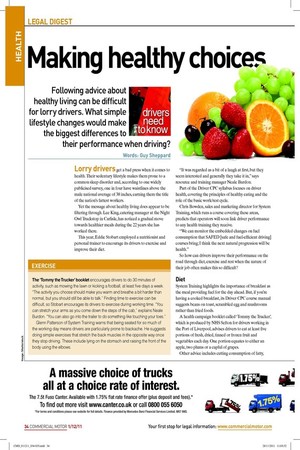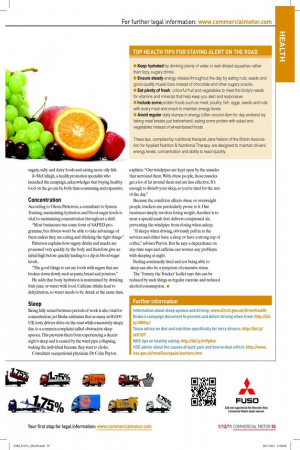Making healthy choices
Page 21

Page 22

If you've noticed an error in this article please click here to report it so we can fix it.
Following advice about healthy living can be difficult for lorry drivers. What simple lifestyle changes would make the biggest differences to their performance when driving?
Words: Guy Sheppard Lorry drivers get a bad press when it comes to health. Their sedentary lifestyle makes them prone to a common sleep disorder and, according to one widely publicised survey, one in four have waistlines above the male national average of 38 inches, earning them the title of the nation’s fattest workers.
Yet the message about healthy living does appear to be iltering through. Lee King, catering manager at the Night Owl Truckstop in Carlisle, has noticed a gradual move towards healthier meals during the 22 years she has worked there.
This year, Eddie Stobart employed a nutritionist and personal trainer to encourage its drivers to exercise and improve their diet. “It was regarded as a bit of a laugh at irst, but they seem interested and generally they take it in,” says resource and training manager Neale Burdon.
Part of the Driver CPC syllabus focuses on driver health, covering the principles of healthy eating and the role of the basic work/rest cycle.
Chris Bowden, sales and marketing director for System Training, which runs a course covering these areas, predicts that operators will soon link driver performance to any health training they receive.
“We can monitor the embedded changes on fuel consumption that SAFED [safe and fuel-eficient driving] courses bring; I think the next natural progression will be health.” So how can drivers improve their performance on the road through diet, exercise and rest when the nature of their job often makes this so dificult?
Diet
System Training highlights the importance of breakfast as the meal providing fuel for the day ahead. But, if you’re having a cooked breakfast, its Driver CPC course manual suggests beans on toast, scrambled egg and mushrooms rather than fried foods.
A health campaign booklet called ‘Tommy the Trucker’, which is produced by NHS Sefton for drivers working in the Port of Liverpool, advises drivers to eat at least ive portions of fresh, dried, tinned or frozen fruit and vegetables each day. One portion equates to either an apple, two plums or a cupful of grapes.
Other advice includes cutting consumption of fatty, sugary, salty and dairy foods and eating more oily ish. Jo McCullagh, a health promotion specialist who launched the campaign, acknowledges that buying healthy food on the go can be both time-consuming and expensive.
Concentration
According to Glenn Patterson, a consultant to System Training, maintaining hydration and blood-sugar levels is vital to maintaining concentration throughout a shift.
“Most businesses run some form of SAFED programme, but drivers won’t be able to take advantage of them unless they are eating and drinking the right things.” Patterson explains how sugary drinks and snacks are processed very quickly by the body and therefore give an initial high before quickly leading to a dip in blood-sugar levels.
“The good things to eat are foods with sugars that are broken down slowly such as pasta, bread and potatoes.” He adds that body hydration is maintained by drinking fruit juice or water with food. Caffeine drinks lead to dehydration, so water needs to be drunk at the same time.
Sleep
Being fully rested between periods of work is also vital for concentration, yet Brake estimates that as many as 80,000 UK lorry drivers drive on the road while excessively sleepy due to a common complaint called obstructive sleep apnoea. This prevents them from experiencing a decent night’s sleep and is caused by the wind pipe collapsing, waking the individual because they start to choke.
Consultant occupational physician Dr Colin Payton explains: “Our windpipes are kept open by the muscles that surround them. With obese people, those muscles get a lot of fat around them and are less effective. It’s enough to disturb your sleep, so you’re tired for the rest of the day.” Because the condition affects obese or overweight people, truckers are particularly prone to it. One treatment simply involves losing weight. Another is to wear a special mask that delivers compressed air, preventing the windpipe from closing when asleep.
“If sleepy when driving, obviously pull in at the services and either have a sleep or have a strong cup of coffee,” advises Payton. But he says a dependence on day-time naps and caffeine can worsen any problems with sleeping at night.
Feeling continually tired and not being able to sleep can also be a symptom of excessive stress.
The ‘Tommy the Trucker’ lealet says this can be reduced by such things as regular exercise and reduced alcohol consumption. ■











































